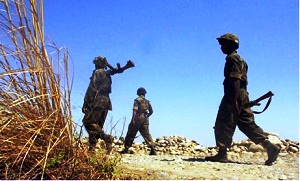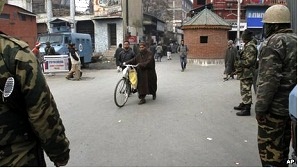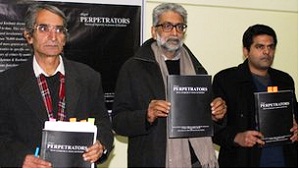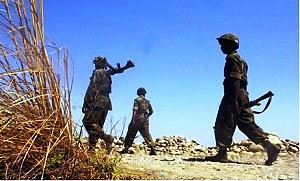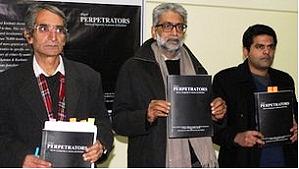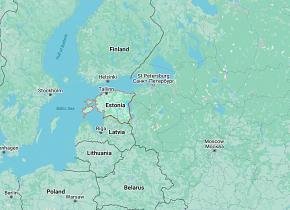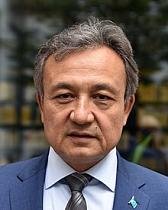Kashmir’s tempestuous human right abuses
"We the Peoples of the United Nations, determined to reaffirm faith in fundamental human rights, in the dignity and worth of the human person, in the equal rights of men and women and of nations large and small..." -- United Nations Charter
British Foreign Secretary William Hague set to tackle Africa war rape will be on a fact finding mission to Africa giving him an opportunity to collect evidence to take to the foreign ministers of the G8 who meet in London on April 10, 2013. It is believed that Mr Hague will call for tougher action on warzone rapists citing such acts of sexual violence as breaching the Geneva Convention. Mr Hague is reported to have said: "Yet more often than not the international community looks away, the perpetrators of these brutal crimes walk free and the cycle of injustice and conflict is repeated. We have to shatter this culture of impunity." Kashmir, which has suffered in bigger way hope and expect Mr Hague to remember them as well on G8 meet and not to look away and ignore suffering Kashmiris.
Yasmina hailing from Wantpora Hawal in downtown Srinagar was rushed to the hospital after developing complications due to exposure to pepper gas used by Indian troops to quell the uprising. The pregnant lady was operated upon and her foetus terminated. It is reported that the placenta was removed by the surgeons after administration of anaesthesia. The State Human Right Commission, while taking suo motu cognizance of news reports about use of pepper gas and its harmful effects unsuccessfully urged Indian army to stop the use of pepper gas. Besides, the experts and doctors, while warning about the harmful and hazardous effect, have termed it as life threatening. (Ishfaq Tantry from Srinagar: March 18, 2013).
Jason Burke (Guardian: December 06, 2001) reports that 500 perpetrators of human right abuses are identified from low-ranking policemen to Indian army generals. The report says that many army personnel and generals have been decorated for the outstanding feats performed to crush Kashmiri population which include shootings, abductions, torture and rapes. Though violence, as claimed, has subsided in recent years, in part due to ´warm relations´ with neighbouring Pakistan, the Indian army establishment for unknown reasons believes the potential for renewed conflict in Kashmir to remain high.
The report further says that a US diplomatic cable leaked by Wiki Leaks and published by the Guardian in December 2010 revealed a briefing to the US embassy in Delhi describing continuing torture and arbitrary detention by Indian army in Kashmir. The dispatches revealed the concerns about the use of electrocution, beatings and sexual humiliation against hundreds of detainees. Other cables show that American diplomats were concerned about widespread human right abuses by Indian security forces, who they said relied on torture for confessions.
Member Legislative Assembly, Langate, Engineer Rasheed condemned firing on civilians in Pulwama, Kashmir and said that the incident was an eye-opener for those who gave Kashmiris sermons of peace and non-violence and that use of force against civilian protestors could be justified by saying that they were pelting stones. IGP (Inspector General Police) Kashmir Shiv Murari Sahai confessed that use of force could have been avoided and emphasized need to take stern action against those who were always in search of an opportunity to quench their thirst for human blood. Rejecting the magisterial probe into such incidents had become a symbol of joke, cheating and denial in Kashmir. (Rising Kashmir: 29 Dec 2012).
While tens of thousands of army and paramilitary troops are deployed in Kashmir more than 500 members of India's army are accused of human rights abuses in a damning report on conflict in Kashmir. The offences detailed in the report by leading human right groups include custody deaths, abduction, torture and rape. Army, police and paramilitary officers of senior rank are among those named.
A 354-page report compiled by the Association of Parents of Disappeared Persons (APDP) and the International People's Tribunal on Human Rights and Justice in Kashmir, analysed 214 cases of abuse and highlighted the role of officials in the killing of nearly 70 people and the disappearances of 8,000 people over two decades, BBC's Riyaz Masroor in Srinagar says. The report names Indian military officials of very senior rank as perpetrators.
Releasing the report in Srinagar, Kartik Murukutla, a human rights lawyer and one of the authors of the report, said "India's priority in Kashmir was to control the territory, not pursue justice and that despite the evidence, many of those accused of brutality were decorated for their role in fighting the separatist insurgency. While we believe in fixing the responsibility on the individuals, we have highlighted the culpability of the Indian state in shielding the perpetrators," the APDP (Association of Parents of Disappeared Persons) chief Parvez Imroz said. (bbc.co.uk: 6 December 2012)
It is reported, quoting Wajahat Habibullah, Chairman NMC (National Minorities Commission) that there have been widespread allegations of rape against Indian army in Kashmir, never investigated as the perpetrators have immunity to commit such crimes. (Countercurrents.org January 03, 2013). Violence has served as a tool to affirm power and increasingly, women have become a medium through which the armed forces assert their authority and inflict human rights abuses.
Dr Maiti, a professor of political science at Rurdwa University, West Bengal, reportedly explained, "Rape continues to be a major instrument of Indian oppression against the Kashmiri people while the victims are generally civilians. This concept stands fortified by a report of International Committee of Red Cross (ICRC) dated March 6, 2001, which mentions that women are raped in order to humiliate, frighten and intimidate the defenceless populace. While addressing a seminar at the UN in Geneva, entitled, “Defending the Democratic Processes", British parliamentarian, George Galloway, also confirmed that India is using rape as a weapon to continue occupation of Kashmir.
With victims numbering around ten thousand, Kashmir has surpassed the figures of Sierra Leone, Sri Lanka and Chechnya. A media portal of UK maintains that non-governmental organizations hardly took interest in documenting the plight of these silent sufferers of Kashmir. This has even been admitted by UN Special Representative Margot Wallstrom when she recently said. "It has become such a way of life in some conflict zones like Kashmir that many victims are simply too afraid to report it and you can understand that," And even in those cases, where the victims manage to transcend these fears and report the matter to police, they achieve little or no justice because of the legal immunity provided to the erring soldiers.
If the international community remains a mute spectator to the war crimes in Kashmir, the people will lose trust in international law because of the strong developing perception that it applies only to the poor and weak and not to the strong and powerful? If you want global security, there are a lot of things to do, but the first thing is to have values or standards that are equal and fair.
Please use your freedom to promote ours. [Aung San Suu Kyi]
Comments
There are 0 comments on this post


